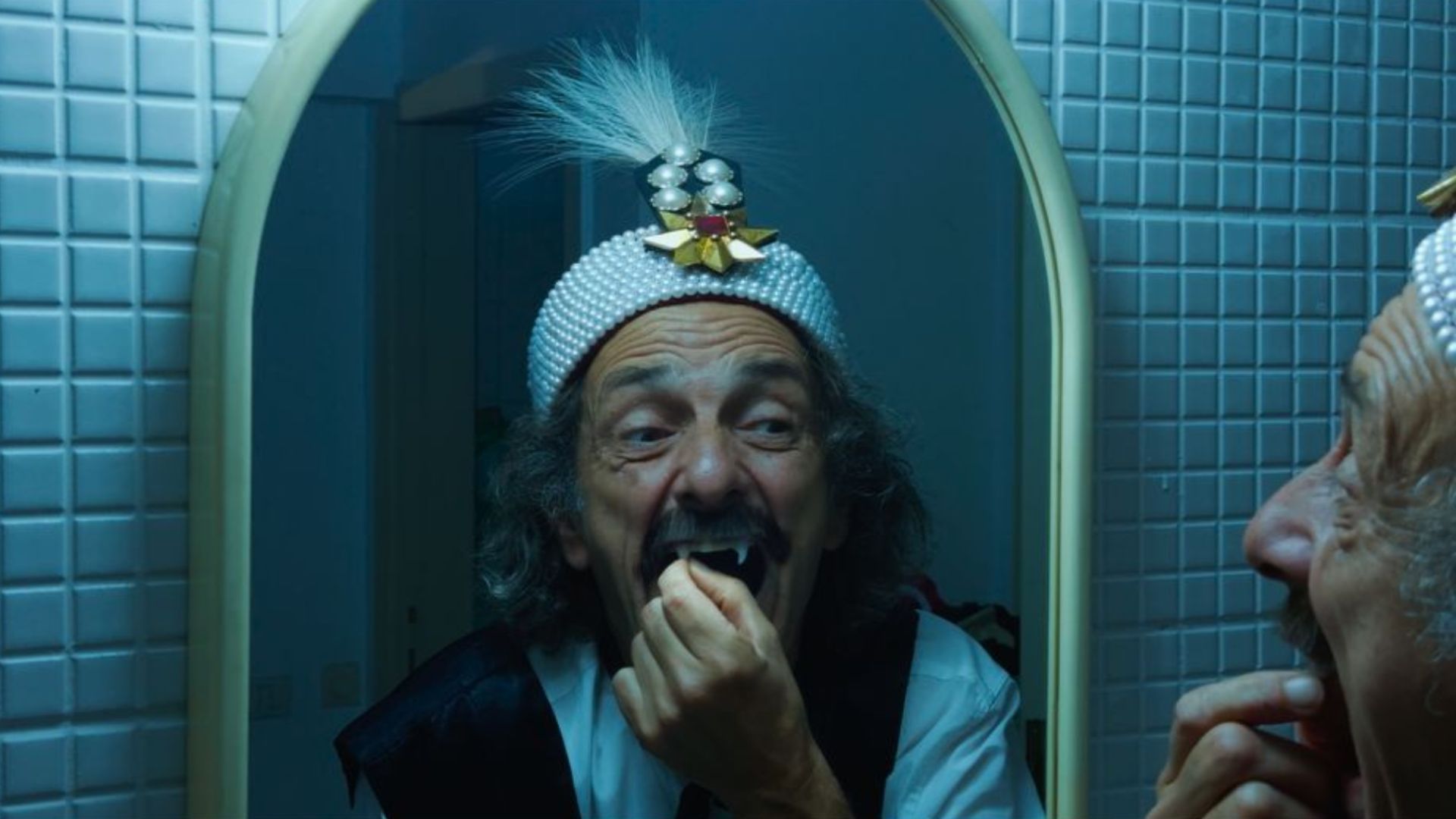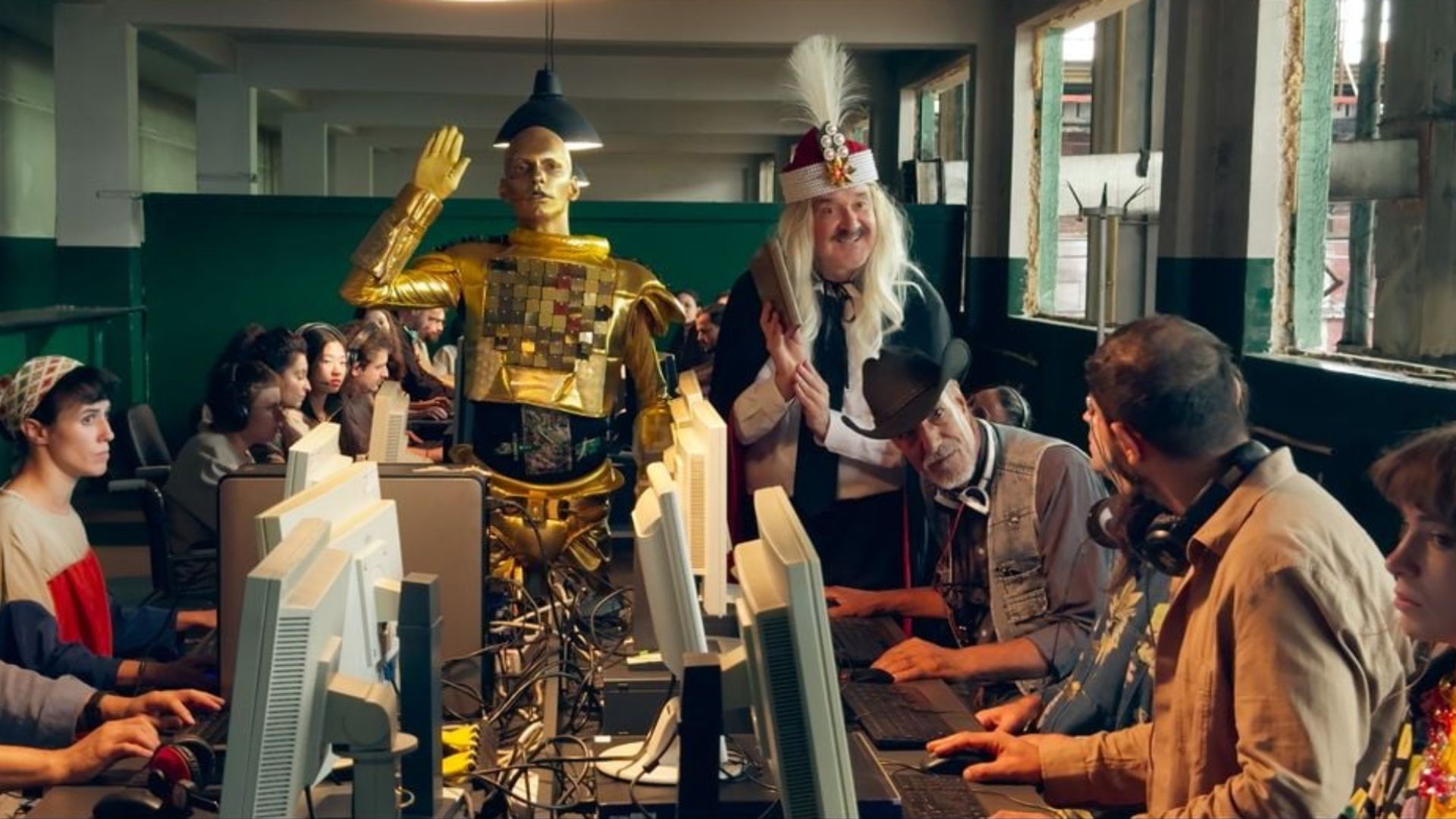
Radu Jude’s Dracula isn’t a single film, but rather a collection of around seventeen different movies—and surprisingly, most of them are effective. Jude, known for his bold and unconventional style, has cleverly blended a classic Romanian tale with a timely issue: the growing use of artificial intelligence in creative fields.
Jude’s choice to use this technology highlights his dislike of AI “tools,” but also reveals his appreciation for the unique and sometimes flawed nature of human creativity. While AI may seem capable of endless creation, its results lack the depth and originality of the human mind. By revisiting Dracula, Jude implies that fully accepting both the best and worst aspects of humanity can defeat the emptiness of AI-generated content.
What makes the film Dracula so engaging is how surprisingly relatable its chaotic story is. It captures that energetic feeling of talking to someone who jumps from one idea to another, and then to tangents of those ideas. Though it can be a lot to follow Jude’s thoughts, it’s exciting to experience his train of thought. The story centers on a director, Adonis Tanța, who is unmotivated and lacks talent. He uses AI technology—given names that nod to the Dracula mythos, like DR. AI JUDDEX—to create a version of Dracula that he thinks will appeal to Hollywood. Tanța brilliantly portrays the worst kind of advocate for these tools: people who say they love art but don’t want to put in the effort to create something worthwhile, and who see AI as a shortcut to making something truly great.
The film Dracula begins with a seemingly normal premise. The central storyline follows a live, interactive show where actors (Gabriel Spahiu and Oana Maria Zaharia) perform scenes from the Dracula story, and the audience gets to chase them around town with makeshift weapons like hammers and wooden stakes. However, the director character, played by Tanța, becomes bored with this and instructs his AI to create additional storylines, all involving Dracula.
The film playfully interrupts its main story with short, titled scenes, creating a unique and captivating rhythm. These moments reflect our current culture of constant distraction—the tendency to reach for our phones during a slow moment—and offer a critique of it. A key source of enjoyment is watching the artificial intelligence consistently fail at its tasks, highlighting that it’s not the flawless content creator some claim it to be, and that it’s filled with the prejudices of its creators. For example, when asked to create a lesbian version of the story, the AI admits it can’t, due to its European origins. Similarly, a request for a silent film results in only half the story being muted, while the rest is surprisingly loud, creating a comical effect.

1-2 Special
The many sketches presented collectively explore how the endless retelling of Dracula stories has ultimately diminished their impact. Once a character becomes heavily commercialized – appearing on memes and merchandise like the popular Labubu figure – does that diminish the story’s meaning? Is that the natural outcome of a story becoming legendary? Can stories endure without being changed by the demands of modern consumer culture, which prioritizes recognizable brands over deeper engagement? While Jude’s film doesn’t directly address these questions, the various, often flawed, reinterpretations of Dracula across different genres lay the groundwork for Jude’s reflections on how we remember, represent, and protect a story’s original intent.
Jude’s Dracula embraces the beauty of imperfection in art. The film suggests that mistakes aren’t flaws to be removed, but essential parts of the creative process. When Jude uses AI in the film, he intentionally layers jarring images quickly, creating a disorienting, almost overwhelming effect. This deliberate ‘vulgarity’ highlights the film’s central idea: the true horror of AI isn’t its failures, but its relentless pursuit of flawless, polished imagery. Ironically, this attempt at perfection results in something sterile and unsettling.
What truly makes films special are the little, imperfectly human details – like a slightly blurry shot from a phone or sound that’s not quite clear during an action scene. The story of Dracula is simply too compelling to stay forgotten, and Jude’s new take on it shows us why this classic tale continues to resonate with audiences.
From 1-2 Special, Dracula opens in limited theaters on October 29.
Read More
- Best Controller Settings for ARC Raiders
- Ashes of Creation Rogue Guide for Beginners
- Stephen Colbert Jokes This Could Be Next Job After Late Show Canceled
- DCU Nightwing Contender Addresses Casting Rumors & Reveals His Other Dream DC Role [Exclusive]
- 7 Home Alone Moments That Still Make No Sense (And #2 Is a Plot Hole)
- Is XRP ETF the New Stock Market Rockstar? Find Out Why Everyone’s Obsessed!
- 10 X-Men Batman Could Beat (Ranked By How Hard It’d Be)
- Gigi Hadid, Bradley Cooper Share Their Confidence Tips in Rare Video
- 4 MMO Games That Were Supposed to Be World of Warcraft Killers (and What Happened to Them)
- Emmerdale star Joshua Richards on Bear’s shocking descent into modern slavery – and past role exploring “horrifying” subject matter
2025-10-28 03:33